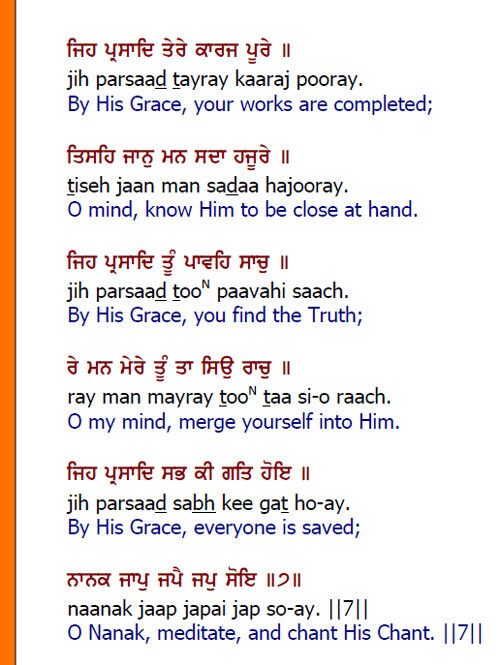

Through willing obedience to Waheguruji's Command and Will The avarice of the greedy is not satiatedĮven though loaded with world's riches.

Kiv sachira hovie kiv koore tute paal hukam rajai chalna nanak likhia naal ||1||īy taking bath in holy river a hundred thousand times,Įven by perpetual meditation. Sehas sian pa lakh hoe ta ek na chale naal O Nanak True Shall Waheguruji be Forever.Ĭhopai chup na hovai je lae raha lev taarīhokhia bhukh na utree je banna puria paar (we ask for Salvation, Salvation can only be bestowed (By taking a step on a journey to seek The Truth, (There is none that Created the Almighty,)īy The Guru’s Grace The Truth is Obtained (Waheguru does not go through reincarnation.) (Everything goes through a cycle of birth/death The Truth does not go through the cycle of birth and death (There is Only One, no equal that exists, (There is Only One, no equal, Fear does not exist.) Only The Truth can give Creation existence (Literally Sat means Truth and Naam means name) (All are born and die playing their role in God's Play.) (All beings, All forces, good, evil, order, chaos, serve the Will of One God, ("The Truth" is - The Creator, Sustainer, and Destroyer. However, the exact meaning cannot be written or spoken in words, it can only be felt by the one who knows the gurmukhi Punjabi language. This translation is just for a quick meaning. The Sikh treat the Guru Granth Sahib as a living Guru and the respect shown for the Shabad or ‘Message of the Gurus’ is unique in the faith.Īttention : The English translation of Guru Granth Sahib Ji is as per a normal human thinking and will not be believed as the absolute meaning of it. At the point when the last of these Gurus departed this Earth, the Guruship was passed to the Sikh Holy Book, the Guru Granth Sahib. The Ten Gurus of Sikhism were responsible for the creation of this faith which took place over period 1469 to 1708 – a period of about 239 years. This Bani was composed by the founder of the faith, Sri Guru Nanak Dev, who was the first of ten Sikh Gurus. 'Ji' can also be used to refer to one's own soul. ‘Ji’ is a word that is used to show respect as is the word ‘Sahib’.

The word ‘Jap’ means to ‘recite’ or ‘to ‘chant’. It is regarded as the most important Bani or 'set of verses' by the Sikhs and is recited every morning by all practising this faith. The Japji appears at the very beginning of the Guru Granth Sahib, the Holy Book of the Sikhs. Japji Sahib consists of the Mool Mantra as the beginning followed by 38 hymns and a final Salok at the end of this composition. Japji is a universal song of God composed by Guru Nanak Dev, the founder of the Sikh faith.


 0 kommentar(er)
0 kommentar(er)
